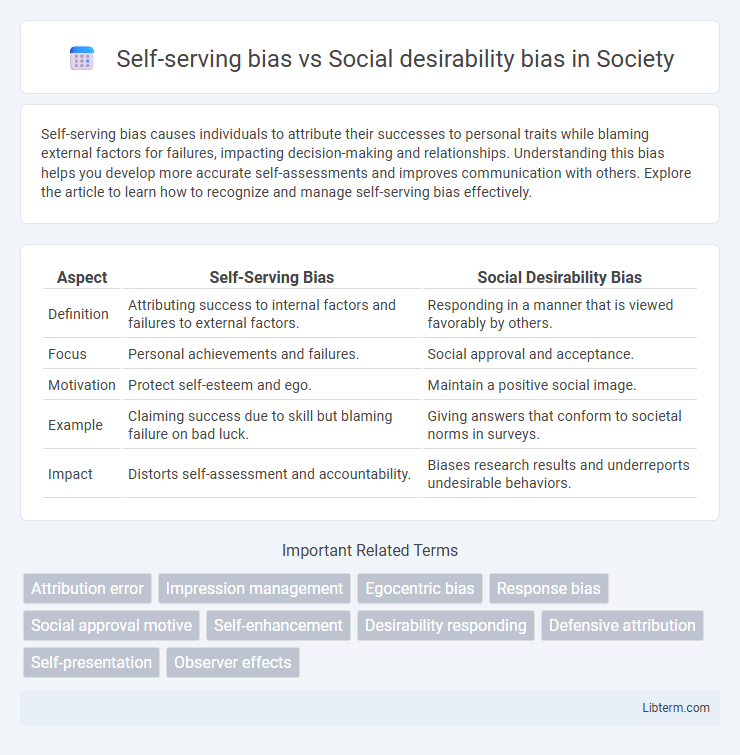Self-serving bias causes individuals to attribute their successes to personal traits while blaming external factors for failures, impacting decision-making and relationships. Understanding this bias helps you develop more accurate self-assessments and improves communication with others. Explore the article to learn how to recognize and manage self-serving bias effectively.
Table of Comparison
| Aspect | Self-Serving Bias | Social Desirability Bias |
|---|---|---|
| Definition | Attributing success to internal factors and failures to external factors. | Responding in a manner that is viewed favorably by others. |
| Focus | Personal achievements and failures. | Social approval and acceptance. |
| Motivation | Protect self-esteem and ego. | Maintain a positive social image. |
| Example | Claiming success due to skill but blaming failure on bad luck. | Giving answers that conform to societal norms in surveys. |
| Impact | Distorts self-assessment and accountability. | Biases research results and underreports undesirable behaviors. |
Introduction to Cognitive Biases
Self-serving bias involves attributing personal successes to internal factors while blaming failures on external causes, enhancing self-esteem and protecting ego integrity. Social desirability bias leads individuals to present themselves in a favorable light by conforming to social norms and expectations, often distorting truthful responses in surveys or interviews. Both biases significantly influence human judgment and decision-making, highlighting cognitive distortions that affect perception and behavior in social contexts.
Defining Self-Serving Bias
Self-serving bias is a cognitive tendency where individuals attribute their successes to internal factors, such as ability or effort, while blaming external factors for their failures. This bias serves to protect self-esteem and enhance self-image by skewing perception towards personal advantage. In contrast, social desirability bias involves presenting oneself in a favorable light to others, often by conforming to social norms or expectations in responses.
Understanding Social Desirability Bias
Social desirability bias occurs when individuals respond to questions in a manner they believe will be viewed favorably by others, often leading to overreporting of positive behaviors or underreporting of negative ones. This bias significantly affects survey data accuracy, especially in sensitive topics such as drug use, sexual behavior, or controversial opinions. Understanding social desirability bias helps researchers design better questionnaires and implement techniques like anonymous responses to reduce its impact.
Key Differences Between the Biases
Self-serving bias involves individuals attributing successes to personal factors and failures to external causes, enhancing self-esteem and protecting self-image. Social desirability bias leads individuals to respond in ways they believe are socially acceptable or favorable, often distorting truthful responses in surveys and research. The key difference lies in self-serving bias being internally motivated to maintain a positive self-concept, while social desirability bias is externally motivated by the desire to conform to social norms and gain approval.
Psychological Mechanisms Behind Each Bias
Self-serving bias arises from the psychological need to maintain and enhance self-esteem by attributing successes to internal factors while blaming failures on external circumstances. Social desirability bias stems from the desire to be viewed favorably by others, leading individuals to overreport socially approved behaviors and underreport undesirable ones to align with societal norms. Both biases involve distinct cognitive processes: self-serving bias engages self-enhancement motives, whereas social desirability bias is driven by impression management and adherence to social expectations.
Impact on Personal Decision-Making
Self-serving bias skews personal decision-making by attributing successes to internal factors and failures to external causes, leading to distorted self-assessment and resistance to constructive feedback. Social desirability bias influences decisions by prompting individuals to conform to perceived social norms, often resulting in choices that prioritize approval over authenticity. Both biases undermine objective decision-making and can hinder personal growth and accurate self-evaluation.
Influence in Social and Professional Settings
Self-serving bias influences social and professional settings by causing individuals to attribute successes to internal factors and failures to external ones, which can distort feedback and hinder growth. Social desirability bias impacts these environments by leading people to present themselves in a favorable light to conform to social norms, affecting the authenticity of self-reports and interactions. Both biases shape decision-making, interpersonal dynamics, and performance evaluations, often complicating communication and trust within teams.
Examples from Everyday Life
Self-serving bias often appears when individuals attribute their successes to personal skills, such as a student claiming high exam scores are due to their intelligence, while blaming failures on external factors like unfair test questions. Social desirability bias occurs when people modify their responses or behaviors to align with perceived social norms, such as an employee overstating their punctuality during a performance review to appear more reliable. Both biases influence everyday decision-making and self-presentation, impacting interpersonal relationships and social interactions.
Strategies to Minimize Each Bias
To minimize self-serving bias, individuals can practice self-reflection and seek objective feedback from others to gain a balanced view of their contributions and failures. Addressing social desirability bias involves creating anonymous survey environments and emphasizing the importance of honesty to encourage truthful responses without fear of judgment. Both strategies enhance accuracy by promoting transparency and reducing the influence of distorted self-perception or social approval pressure.
Implications for Research and Data Collection
Self-serving bias can lead to inflated self-reports, compromising the accuracy of data by causing participants to attribute successes internally while blaming failures externally. Social desirability bias prompts respondents to answer questions in a manner that will be viewed favorably by others, often resulting in underreporting of undesirable behaviors or attitudes. Both biases pose significant challenges for research validity, necessitating the use of anonymized surveys, indirect questioning techniques, or triangulation methods to mitigate their impact on empirical data collection.
Self-serving bias Infographic

 libterm.com
libterm.com